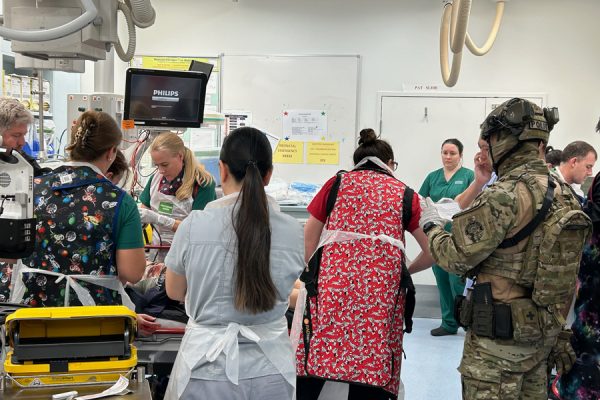Multiple agencies team up with RBWH for realistic training simulation

Simulations such as this one are extremely valuable in building efficient processes.
A Queensland Police Special Emergency Response Team (SERT) vehicle pulls up at the RBWH Emergency Department and three officers transfer one of their colleagues, bleeding and in distress from two gunshot wounds to the ETC team.
The Emergency team, already prepared for her arrival thanks to a pre-notification call from Queensland Ambulance (QAS) only minutes earlier, take over care of the patient. Within minutes she is assessed, lifesaving blood transfusion is commenced, and the team ready her for transfer to an operating theatre.
In this case, though, the injured SERT officer’s cries of pain, and the blood from her wounds, are all fake. This is a training scenario.
The RBWH recently hosted a Multi-agency Trauma Training Simulation exercise, in collaboration with QAS and the QPS, that was a first of its kind for Queensland. The scenario was focused on the reception and initial management of a critically injured SERT officer.
RBWH was the test site to work through the pathway. The simulation was coordinated by the Teamwork and Collaborative Training (TACT) team along with ETC, Trauma Service, Surgery, Medical Imaging, Blood Bank, Anaesthetics and Perioperative Services along with QPS, QAS and Metro North Health Disaster Response.
A real-life SERT officer was used as the “patient” to ensure the scenario was as realistic as possible. The simulation ran successfully but the real value was in the learning conversations that took place afterwards in the debrief.
Director Trauma Services Dr Carl Lisec said it was a test of a new process whereby trained police medics provided immediate, life-saving treatment at the scene and then transport the patient directly to hospital themselves, without the direct assistance of the Queensland Ambulance Service.
Simulations such as this one are extremely valuable in building efficient processes – and additionally, the SERT officers involved will now be far more familiar with the hospital and its operational procedures.
“This saves valuable time for the patient and ensures they reach the operating room for definitive care as quickly and as safely as possible,” Dr Lisec said.
